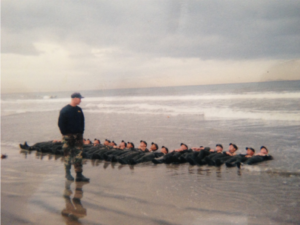Chaos Reigns!
The past several weeks have been unprecedented on almost every level. COVID-19 continues to wreak havoc across the globe. Several of the world’s largest economies have temporarily shut down in an effort to abate the rising tide of infections.
The preliminary data on the impact to the global economy is staggering. If you work in Finance, you are likely looking at a screen flashing red. If you work in hospitality, you are trying to figure out if you can hold your breath long enough to survive. And if you’re in the energy sector, COVID-19 and a price war between the leading state providers of oil has created the perfect storm.
To make matters worse, our childcare safety net – the education system – has shut down. Working parents are simultaneously adjusting to working from home and homeschooling their children. If businesses start to open their offices before schools do, this problem endures and is exacerbated. If you have high-risk friends or family members, you are extremely worried about safeguarding them.
For many, this is probably the closest you will ever come to frontline combat, as every day feels like a firefight. A victim mindset can easily settle in as you try to hold back the competing forces that are disrupting your financial and psychological well-being.
The Only Easy Day was Yesterday!

Over the years people have asked what it takes to make it through SEAL training and what it is like to lead in combat. There are a fair number of books on the subject, but the best answer I have ever heard came from a Gold Star Spouse. She said that the one thing that all of us have in common is the ability to compartmentalize mental pain. This skill allows us to filter the different pressures confronting us and focus on the most critical tasks needed to survive and eventually thrive in chaotic situations. This capability is critical and decisive on the battlefield as it allows you to toggle between risks and opportunities faster than your enemy.
As you think about how you might apply this to yourself, start with setting short and achievable near-term plans, and develop a repeatable and sustainable daily battle rhythm that allows you to normalize the pain of your current reality. Write down your work processes from before, and then list the constraints of the new environment; this is a great starting point for a new daily cadence that you can test and learn from. This will set you up for achieving some small wins that you can build off of as a foundation. It won’t be easy, but if you focus on achieving those small victories you will string enough of them together to create real momentum.
At the end of each day, assess what worked and what didn’t before you start the process over again. Mentally, you are much stronger than you realize, so just keep grinding! Once your confidence starts to build, begin looking farther out as most of your competition undoubtedly has their heads down. Now that you have your personal conditioning back to normal, it is time to think about your team.
Counter-Attack!

There is an ebb and flow to every battle. Usually if you are able to withstand the initial onslaught, there will be opportunities to exploit your adversary’s weakness. There are some elements of leading in crisis that teams should be thinking about even as they respond moment-to-moment in a very dynamic situation. Here are four questions to consider in this crisis moment that may offer the potential to help you achieve a decisive breakout.
- How will the new reality differ from the old one? A lot of companies are waiting for a “return to normalcy,” but we must acknowledge that once this crisis passes, the world will have changed and there will be a new normal. Will we see more employees working remotely? Will grocery delivery services displace trips to the store? Will academic institutions that previously scoffed at online learning start to embrace it? Turn your attention to the changes in your industry that you think will stick, and consider how you will adapt your business when they do.
- Adversity reveals character – what are you seeing in your leaders? You don’t know the strength of your team until it is tested, and it is being tested right now. You will learn a great deal about your team by observing how they handle stress, collaborate with one another, and lead during a crisis. Leaders right now must balance empathy with cold hard decisive decision making. The balance is tough but one you must master as a War-Time Leader.
- Does this crisis offer an opportunity to make decisions we’ve previously postponed? Even the best management teams sometimes kick-the-can on difficult decisions, whether they be about the businesses we’re in, our processes, or the people we lead. A crisis forces us to confront these decisions, sooner rather than later. Whether it is exiting a struggling business or sunsetting a product that has run its course, we are in a rare environment where these types of hard decisions are expected and thus feel more acceptable internally and externally.
- Are you prepared to take advantage of a buyer’s market? We’ve entered a period of economic uncertainty of unknown length, but what’s immediately clear is this: some incredible talent is soon-to-be on the market, as well as some companies with outstanding capabilities. This crisis may offer an incredible opportunity to upgrade your existing team, whether through hiring or acquiring a business or capability. Consider how resources saved in question 3 might help you do this.
Thinking through these questions now will give you a significant advantage during and after the current crisis.
Wartime Leader!

There are lots of good peacetime leaders and lots of good wartime leaders, but very few leaders are effective in both peacetime and wartime. This feels like wartime for most businesses, and as leaders, we must adapt our style to lead in crisis or decide to follow others who will. In peacetime, we can deeply contemplate each of our options, spend time generating buy-in, and encourage constructive debate. In wartime, we must set aside certain management best practices in favor of decisiveness and speed. Ben Horowitz wrote about this concept extensively in his book The Hard Thing About Hard Things. Below are a few of the compelling contrasts he presents between peacetime and wartime leaders:
- Peacetime CEO strives for broad-based buy-in. Wartime CEO neither indulges consensus-building nor tolerates disagreements.
- Peacetime CEO always has a contingency plan. Wartime CEO knows that sometimes you gotta roll a hard six.
- Peacetime CEO spends time defining the culture. Wartime CEO lets the war define the culture.
But how do you become a Wartime leader? When you join the Navy, one of the first things you learn is the creed “Ship, Shipmate, Self.” This order helps you prioritize your actions and focus during times of crisis.
Ship: The Ship is your mission. If it fails (or sinks in this case), absolutely nothing else matters. Wartime leaders must save the Ship at all costs. Often, this requires a central actor making decisions because collaboration that could result in misalignment poses too much risk. In the SEAL teams, we used to say, “A bad plan well executed beats a great plan poorly executed every time.” Inevitably, you will make mistakes – however, if you adapt your operating cadence to allow for quick iterations and fast feedback, you “get right quick”. For some, this will be uncomfortable – but when everything is on the line, people want to follow a strong, decisive leader.
Shipmates: As a leader, your job is to serve your teammates before yourself. In SEAL training, everywhere you go you have a swim buddy. You learn quickly that your teammates’ success is your success and that there is no room for individuals in a crisis. Be empathetic to the situation that your team is in, and make it your priority to (1) ensure their health and safety and (2) remove obstacles that are limiting their success. You’ll find that this behavior establishes trust that will last beyond the current crisis.
Self: Last, take care of yourself. While it will be your lowest priority after your company and your team, you must look out for yourself as well. Review what we discussed previously about a personal daily battle rhythm – this process will help you set the conditions to adapt to the new reality once the adrenaline you likely feel in this moment wears off.


